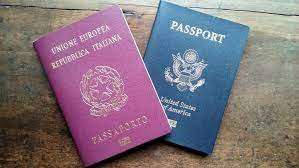What does having dual citizenship in Italy mean?
Any nation grants you legal liberties and rights that aren’t available to tourists after you become a citizen. It is possible to be a citizen of more than one nation, and you can show this by having passports from additional nations.
If you want to live and work in Italy, either temporarily or permanently, without giving up your current national legal rights (or passport), you can have dual citizenship. So if you have been asking yourself the question, can I get Italian citizenship, the answer is yes.
What are the benefits of holding dual Italian citizenship?
Being an Italian citizen makes it much easier for you to acquire real estate there, as well as giving you the freedom to live wherever you want in any Italian region. You can give your under-18-year-old children Italian citizenship and use your right to vote in Italy.
Gaining the liberties that come with being a citizen of an EU country is one of the key motivations for applying to be a dual citizen of both your native country and Italy. A passport granted in Italy will allow you to migrate anywhere in the European Union. The UK’s exit from the EU severely limits your ability to live and work in Europe if you have a British passport. Italian dual citizenship will therefore be quite beneficial.
Additionally, having dual citizenship in Italy entitles you to the educational, social welfare, and medical assistance granted to Italians and other EU citizens in general. The fact that applying for jobs requires much less paperwork and money will further increase your appeal to Italian firms.
What paperwork is required to apply for dual citizenship in Italy?
Birth certificates that prove your parent or parents are Italian might be an important piece of evidence to support your application. There are additional options, though, that make use of different provisions of Italian law about being eligible for dual citizenship.
If you can show that you have a relationship with Italian-born persons from earlier generations, you may be able to petition for dual citizenship. This is known as “jus sanguinis,” which translates to “right of blood.” This right is based on having documentary evidence of Italian ancestries, such as birth or death certificates issued in Italy, naturalization certificates for relatives issued in Italy, or your own personal civil records. While obtaining digital proof of your ancestors’ births, marriages, or deaths can be useful to you in your research; please keep this in mind- you will still require tangible documents, which you can submit with your Italian dual citizenship application.
Are there any other ways of obtaining dual citizenship in Italy?
If you marry an Italian citizen and complete the necessary requirements, you may apply for Italian citizenship. If you live in Italy, you must have been married for two years; if you reside outside of Italy, you must have been married for three years. To prove this, you will require a marriage certificate.
If you have resided in Italy for more than ten years legally with a resident visa, you may also apply to become a citizen of the nation. This process is called naturalization.
Where should I submit my documents and sign the application form?
If you reside outside of Italy, you must bring the necessary documentation to your appointment with your Italian Consulate. During the appointment at the Consulate, the application must be signed in front of the official. If you live in Italy, you can sign an application form in the town hall that is closest to you.

